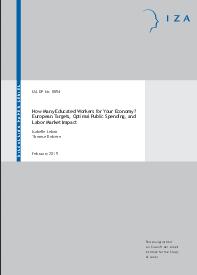Lebon, Ι. & Rebière, Τ. (2015) “How Many Educated Workers for Your Economy? European Targets, Optimal Public Spending, and Labor Market Impact“, IZA DP No. 8854, February. This paper studies optimal taxation schemes for education in a search-matching model where the labor market is divided between a high-skill and a low-skill sector. Two public policy targets –maximizing the global employment level and optimizing the social surplus– are studied according …Read More
A Global Projection Model for Euro Area Large Economies
Jakab, Ζ., Lukyantsau, Ρ. & Wang, S. (2015) “A Global Projection Model for Euro Area Large Economies“, IMF Publications, Working Paper No. 15/50 The GPM project is designed to improve the toolkit for studying both own-country and cross-country linkages. This paper creates a special version of GPM that includes the four largest Euro Area (EA) countries. The EA countries are more vulnerable to domestic and external demand shocks because …Read More
Corporate Taxation in Europe: Let’s get it together!
De Groen, P. W. (2015) “Corporate Taxation in Europe: Let’s get it together!“, Financial Markets, CEPS Commentaries, 16 February More comprehensive cooperation in corporate taxation at European level could significantly advance the region’s socio-economic prosperity, but its potential contribution is unfortunately overlooked in the current search for growth and job creation. Lucrative tax niches established in some member states and the fear of losing fiscal autonomy prevent several countries from …Read More
Capital taxation in the 21st century
Auerbach, J. A. & Hassett, K. (2015) “Capital taxation in the 21st century“, VoxEU Organisation, 03 March. Piketty’s justification for his proposed wealth tax relies on the notion that the rate of return on capital exceeds economic growth. This column challenges this basis, arguing that it fails to account for risk. The authors also examine the relative merits of a consumption tax, which may be more valid. In Capital …Read More
Politics and investment: Examining the territorial allocation of public investment in Greece
Rodríguez-Pose, Α., Psycharis, Υ. & Tselios, V. (2015) “Politics and investment: Examining the territorial allocation of public investment in Greece“, VoxEU Organisation, 03 March. Electoral results and the geographical allocation of public investment in Greece have been intimately related. This column describes how incumbent Greek governments between 1975 and 2009 tended to reward those constituencies returning them to office. Increases in both the absolute and relative electoral returns for …Read More
Credit supply and the housing boom
Justiniano, A., Primiceri, G. & Tambalotti, A. (2015) “Credit supply and the housing boom“, VoxEU Organisation, 27 February. There is no consensus among economists on the forces that drove the historical rise of US house prices and household debt that preceded the Global Crisis. In this column, the authors argue that the fundamental factor behind that boom was an increase in the supply of mortgage credit. This rise was …Read More
Debt sustainability and economic convergence of Euro-area Member States: Challenges and Solutions
Mauro, P. (2015) “Debt sustainability and economic convergence of Euro-area Member States: Challenges and Solutions“, European Parliament, Directorate General for Internal Policies – Economic Governance Support Unit, February. Abstract The Eurozone is at risk of economic stagnation and the crisis has led to the most pervasive and pronounced increase in government debt-to-GDP ratios since the Second World War. Member countries are facing vastly differing economic growth rates, with some …Read More
Fiscal multipliers in downturns and the effects of Eurozone consolidation
Gechert, S., Hughes Hallett, A. & Rannenberg, A. (2015) “Fiscal multipliers in downturns and the effects of Eurozone consolidation“, Centre for Economic Policy Research, Policy Insight No. 79, 25 February. The literature on fiscal multipliers has expanded greatly since the outbreak of the Global Crisis. This column introduces CEPR Policy Insight 79, which reports on a meta-regression analysis of fiscal multipliers collected from a broad set of empirical reduced form …Read More
Tax progressivity and the government’s ability to collect additional tax revenue
Holter, H., Krueger, D. & Stepanchuk, S. (2015) “Tax progressivity and the government’s ability to collect additional tax revenue“, VoxEU Organisation, 20 February. Since the Global Crisis, debt sustainability has received increasing attention. This column argues that the maximum sustainable debt level depends negatively on the progressivity of the tax system. The authors estimate that the US is still relatively far from the peak of its Laffer curve and …Read More
Do derivatives make the world safer?
Vuillemey, G. (2015) “Do derivatives make the world safer?, VoxEU Organisation, 12 February. The interest rate derivatives market has grown tenfold over the past 15 years. These contracts are mostly held by commercial banks, raising financial stability concerns. This column discusses how hedging using derivatives affects bank lending and the occurrence of bank defaults. The interest rate derivatives market is the largest market in the world, with an aggregate …Read More






